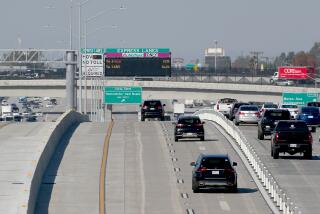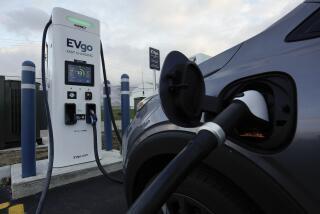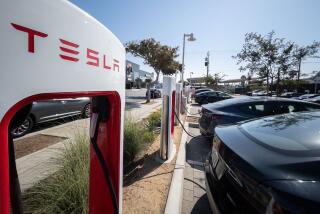Honda offers free insurance to electric Fit buyers
Honda Motor Co.’s new electric vehicle comes with an unusual option: collision insurance without any deductible.
It’s the latest enticement to move electric cars off showrooms and narrow the cost gap with less expensive gasoline-powered vehicles.
“It is a really interesting marketing tool,” said Rebecca Lindland, an analyst with IHS Automotive.
Detroit automakers have generally shied away from offering insurance for drivers. General Motors Co. experimented with the concept last year, offering a year of free auto insurance for new-car buyers in Oregon and Washington. GM let the offer expire without expanding the program.
Honda officials said they see the offer as a way to remove a barrier to the introduction of their first electric car in the U.S. They were concerned that insurers would have trouble rating the financial risk of covering the repairs of such a low-volume vehicle.
Starting with Nissan Motor Co., large automakers began selling electric cars in late 2010. But sales of the vehicles have been slow, hampered by their limited range and higher price compared with gasoline-powered vehicles. They also require homeowners to install charging stations in their garages, an expense that can run $1,500 to $2,500, depending on the home.
Although the amount of insurance savings for Honda’s new Fit EV will vary based on a consumer’s driving record and address, the option can reduce some of that expense. With Honda picking up the collision insurance on the vehicle, a single man living in a Southern California suburb will save as much as $600 a year, according to some insurance industry estimates.
Honda plans to offer just 1,100 leases for the car, an electric version of Honda’s popular subcompact hatchback. It will not be available for outright purchase. It reaches showrooms in July.
The 36-month, 36,000-mile lease will cost $389 a month plus taxes with no down payment. The contract includes roadside assistance, all maintenance as well as the collision insurance. However, consumers leasing the Fit will be required to carry liability insurance at $100,000 per incident and $300,000 overall coverage.
Honda doesn’t offer a lease deal for the gasoline version of a Fit, but a similar lease for the slightly larger Civic is $220 a month with Honda picking up the first of the 36 monthly payments. It does not cover the cost of maintenance, roadside assistance and collision insurance.
Based on current gasoline prices, the Civic will cost about $1,000 more to drive 12,000 miles than the Fit at a nighttime charging rate of 12 cents per kilowatt-hour.
Although automakers are selling electric cars in small volumes, the increasing number of models for sale by the major manufacturers has made the market more competitive, and buyers are starting to see incremental improvements with each new model introduction.
Honda says the Fit EV will have faster acceleration and better passing performance than rival electric vehicles from the big automakers, especially when operated in sport mode. But that will use up more electricity and reduce the range of the car.
Honda also says the vehicle will be more agile. That’s in part because Honda engineers placed the battery pack in a flat configuration across the bottom of the car, which lowers the center of gravity. That design also opens up space in the passenger cabin, where four passengers can travel comfortably.
But what makes the Fit especially interesting to those following the evolution of modern electric vehicles is the small improvements it offers in range, charge time and a new pricing approach.
The Nissan Leaf, the first of this new generation of electric vehicles to market, can travel 73 miles on a single charge and takes about seven hours to charge. The Ford Focus, a recent entrant, can travel 76 miles on a single charge and takes about four hours to charge. The Fit can travel 82 miles on a single charge and takes about three hours to charge.
“Every next-generation electric car is going to be a little bit better than the previous one,” said Thilo Koslowski, an automotive analyst at research firm Gartner Inc. “The technology is improving. Every mile counts. This is an area where the industry can gain a lot more expertise, but that puts early adopters at a disadvantage.”







